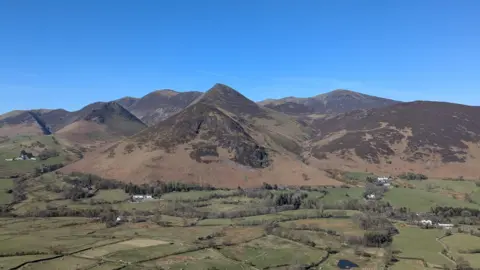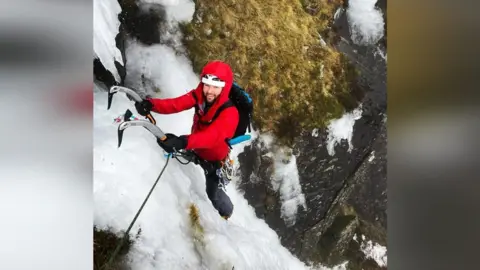Bank holiday walkers warned of mountain 'unknowns'
 BBC
BBCVisitors to the Lake District have been advised of the key importance of preparation to keep safe on the fells, ahead of what is expected to be a busy bank holiday weekend for walkers.
Outdoor instructor Matt Le Voi warned conditions on the top of mountains were often very different to how they appeared in valleys, especially in spring and autumn.
"The biggest thing with transitioning between being outdoors and going into a mountainous environment is that there is a whole raft of unknowns," he said.
It comes after inquests held this week heard how two men died in separate accidents on the fells over the Christmas period.
Roderick Arthur Smith, 77, was walking at Grisedale Tarn, near Ambleside, on Boxing Day when he fell while crossing a stream and banged his head.
Despite the best efforts of his family to attempt chest compressions, the experienced walker was pronounced dead when help arrived from mountain rescue and air ambulance.
In a separate incident three days later, Paul Thomas Boustead, 44, failed to return home after attempting to climb Helvellyn.
His body was found the day after he went missing, about 400ft (120m) from the top of the mountain.
The deaths of both men who had experience of the mountains, were ruled accidental.
 James Gibson
James GibsonMr Le Voi, from Lakeland Mountain Guides, said he had led hundreds of people up mountains in the UK and abroad.
"It's always sad, these accidents happen. It's one those environments which can bite back [and] the consequence are always that bit greater.
"If something happens, help is always that bit further away."
He said a big risk was underestimating how different the conditions could be on the fells.
"Let's say you're in Glenridding and wanted to climb Helvellyn and it could be 15C, that could be chopped to maybe 5C on the summit of Helvellyn."
He added people should be physically prepared and bear in mind different types of terrain and elevation have a big impact on their walk.
"It means that, for a 10k route, we're talking several hours of walking to complete a distance which maybe would take them two and a half or three hours standard on a lower level walk.
He warned accidents could happen to experienced walkers and people should be prepared to wait for rescue, because from a 999 call to police, it could take several hours for mountain rescuers to reach casualties.
Be he added: "There's loads of really cool adventures to be had.
"By taking a little bit of time before you leave to put in some preparation - checking the forecast, making sure you've got the kit, have you got enough food and fluids - means that you will only have a better and more confident and safer adventure when you're out there."
